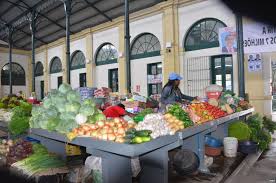While annual food price inflation tops 30%
 National
Statistics Institute consumer price index data from Maputo, Beira and Nampula
cities suggest that the country registered month-on-month inflation of 2.23
percent, with imported food price hikes contributing heavily to the increase.An
INE graph highlights the increase in tomato prices (22.4 percent), onion (25.7
percent), rice (5.3 percent), flour corn (5.7 percent), cassava flour (12.5
percent), butter beans (5.7 percent), and potato-reno (11.7 percent), and shows
no result of the government’s decision to reduce the reference prices for fresh
produce imports by, for example, 44.4 percent for tomatoes, 42.3 percent for
potatoes dropped and 24 percent for onions.This
increase in the cost of life occurred in the same month Mozambicans in formal
employment were informed that their wages would increase only between 4 percent
and 14 percent, while the year’s cumulative inflation since January had already
reached 8.71 percent. For the same period in 2015, the country registered a price
increase in the order of 17.29 percent, when power and non-alcoholic beverages
were the increase leaders.Although
the government blames unrest for the increased cost of living, the INE data
reveals that Maputo, which primarily gets its food supplies from neighbouring
South Africa, has the highest inflation (0.99pp), while Nampula and Beira
cities, which should be the most affected by the conflict, contributed only
0.82pp and 0.42pp respectively to the price hikes.Another
fallacy is that the cost of food imports is the biggest burden on foreign
currency reserves. Bank of Mozambique statements reveal that Mozambique spent
US$37.6 million on fuel but only US$17.9 million on imported food and
medicines.Despite
the international slump, oil prices fuel prices in our Mozambique have not been
adjusted since 2011 (when the OPEC reference price per barrel was US$150; it is
now US$47) and several studies, including one by the International Monetary
Fund, indicate that, since most Mozambicans do not own a car or travel in own,
the subsidy to petrol stations does not benefit the people.In
fact, the biggest single owner of vehicles in Mozambique is the government
executive and its members.
National
Statistics Institute consumer price index data from Maputo, Beira and Nampula
cities suggest that the country registered month-on-month inflation of 2.23
percent, with imported food price hikes contributing heavily to the increase.An
INE graph highlights the increase in tomato prices (22.4 percent), onion (25.7
percent), rice (5.3 percent), flour corn (5.7 percent), cassava flour (12.5
percent), butter beans (5.7 percent), and potato-reno (11.7 percent), and shows
no result of the government’s decision to reduce the reference prices for fresh
produce imports by, for example, 44.4 percent for tomatoes, 42.3 percent for
potatoes dropped and 24 percent for onions.This
increase in the cost of life occurred in the same month Mozambicans in formal
employment were informed that their wages would increase only between 4 percent
and 14 percent, while the year’s cumulative inflation since January had already
reached 8.71 percent. For the same period in 2015, the country registered a price
increase in the order of 17.29 percent, when power and non-alcoholic beverages
were the increase leaders.Although
the government blames unrest for the increased cost of living, the INE data
reveals that Maputo, which primarily gets its food supplies from neighbouring
South Africa, has the highest inflation (0.99pp), while Nampula and Beira
cities, which should be the most affected by the conflict, contributed only
0.82pp and 0.42pp respectively to the price hikes.Another
fallacy is that the cost of food imports is the biggest burden on foreign
currency reserves. Bank of Mozambique statements reveal that Mozambique spent
US$37.6 million on fuel but only US$17.9 million on imported food and
medicines.Despite
the international slump, oil prices fuel prices in our Mozambique have not been
adjusted since 2011 (when the OPEC reference price per barrel was US$150; it is
now US$47) and several studies, including one by the International Monetary
Fund, indicate that, since most Mozambicans do not own a car or travel in own,
the subsidy to petrol stations does not benefit the people.In
fact, the biggest single owner of vehicles in Mozambique is the government
executive and its members.
0 comentários:
Post a Comment